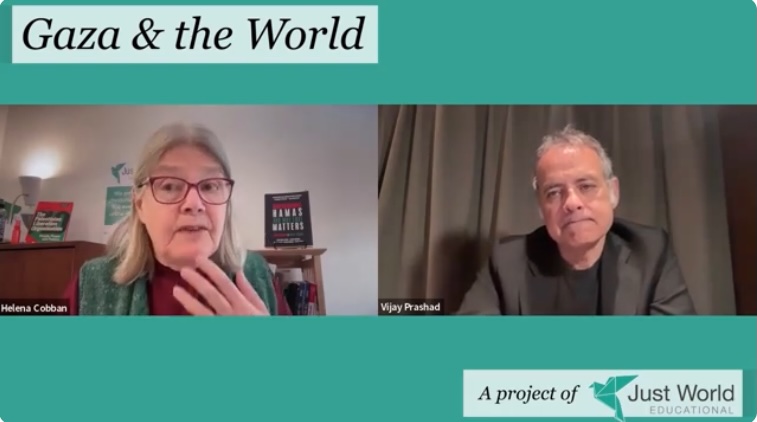In the latest episode of our “Gaza & the World” series, Helena Cobban talked with Vijay Prashad about the intersection of the genocide in Gaza and the shifting global balance of power.
Vijay Prashad is a visionary global justice activist, the executive director of the Tri Continental Institute for Social Research, the editor of Left Word Books, the chief correspondent for Globetrotter, and a senior non-resident fellow at the Chongyang Institute for Financial Studies at Renmin University of China. He was speaking with Helena from Beijing.
In the discussion, the two thinkers tried to assess the current state of the big shifts that are taking place in the global balance of power– primarily, between the “West” and the “Rest”. They examined the role that the US-Israeli genocide in Gaza has played in helping to drive that shift. They also explored the role that China and other countries from ASEAN, or from the BRICS grouping or the Shanghai Cooperation Organization, the SCO, might be able to play in bringing a real end to the genocide in Gaza and starting to roll back the Israeli occupation of Palestinian and other territories in West Asia.
You can watch the whole 64-minute conversation on Youtube, here. You can listen to the audio on Apple Podcasts, Spotify, or Buzzsprout. Or if you’re a text person, you can read the whole transcript here.
Here were some of the major points that Vijay made during the conversation:
** U.S. and Israeli actions and decisionmaking have become so deeply intertwined that, “The dog and the tail are one. There is no dog and tail.”
** The global balance of power is indeed undergoing a seismic shift. But while the U.S. has been losing economic dominance it has retained unparalleled military and communication power.
** The U.S. information apparatus, including major newspapers like the New York Times, continues to shape global narratives, functioning as a propaganda arm of the U.S. State Department, particularly in their coverage of Gaza. During the most intense periods of the Gaza genocide, many in the Global Majority set aside Western media, which they saw as not credible, and turned to more immediate sources like Instagram or TikTok. Those sources, however, provided little context for the events they portrayed. (So Vijay said that projects like the ones JWE runs are particularly valuable!)
** The truce in the U.S.-China trade war that was struck during the recent meeting between the two countries’ leaders in South Korea represented, in fact, an admission by the U.S. side that it could not win the trade contest that it had started earlier this year. “If I’m the one who initiates the conflict, and then if I’m the one who calls for a truce, it’s me who’s backing down, not you.”
** China’s primary role in the shifting world order is not direct intervention, but providing an “insurance” policy for nations in the Global South. The alternative sources of credit and partnership that China offers to such countries allow countries like Namibia or Colombia to speak out forcefully against Western powers without fear of total economic retaliation from institutions like the IMF.
** Most of the current discussions about a “stabilization force” for post-genocide governance in Gaza are duplicitous, especially because no legitimate Palestinian “buy-in” for such plans is possible until Israel releases the thousands of Palestinian political leaders it has kidnapped and imprisoned, which he identified as the primary obstacle to Palestinian political life and unity.
** The immense global footprint of the U.S. military, particularly the Sixth Fleet in the Mediterranean, makes any direct attempt by other nations to break the Gaza blockade or to challenge U.S.-Israeli military actions physically impossible without risking a major global confrontation. “There is a gangster quality to the US Navy and the US military establishment. And I don’t think we should underestimate that danger.”
** Lasting change must therefore come from within the United States. He called for “Degrowth” of the US military and a shift in the American political consciousness away from military spending and global intimidation towards funding domestic needs and celebrating human life over war.
But listen to– or watch, or read– the whole record of this very timely, thought-provoking conversation.

